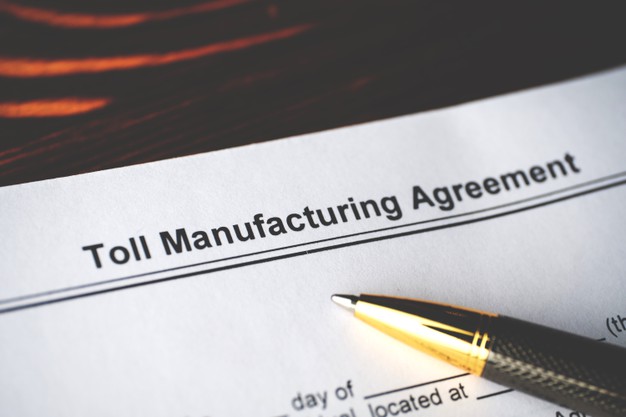This article is written by Arun Nair, who is pursuing a Diploma in Advanced Contract Drafting, Negotiation, and Dispute Resolution from LawSikho.
Table of Contents
Introduction
A ‘toll manufacturing agreement’ can be simply defined as an arrangement wherein one company with specialized resources (machinery/technicians) process raw materials or unfinished goods for a different company. It’s a cost-effective arrangement that specifically works on an ‘as and when required basis’ principle, which benefits both the client and the manufacturer. To top it all off, it also saves precious time for the parties involved.
Sometimes we hear terms so frequently that we assume we know what they mean, whereas, in reality, we may actually not know the definition of the term. You may sometimes see the terms “toll manufacturing” and “contract manufacturing” being used interchangeably. In such an agreement’s companies get the production work done from third parties for multiple reasons such as cost reduction and gain from technologically advanced machinery and specialised and skilled workforce of other parties. These forms of ‘outsourcing of production’ agreements are common in industries such as automobiles and ancillaries, pharmaceuticals, paints, chemicals, lubricants, textiles, etc. While they are quite similar, there’s still some difference between the two.
This article aims at elucidating, in detail, a toll manufacturing agreement, how it operates, the advantages and potential risks associated with it, other complexities, and predominant considerations for opting for such an arrangement.
Delving into the details of a toll manufacturing agreement
What is toll manufacturing?
Toll manufacturing is an option by the way of which manufacturers of products can expand and diversify their supply chain. It is a strategic decision that is taken when your own manufacturing units are working at full capacity. Another instance where a toll manufacturing arrangement may find useful is when a manufacturer comes up with a product innovation that would require considerable capital investment, however, he may hold on to the decision till the product proves its viability in the market. Notwithstanding the circumstances, a toll manufacturing relationship can save the manufacturers time and money by extending the supply chain.
The contract manufacturing difference
Toll manufacturing is a process in which a company is responsible for processing raw materials or semi-finished products and turning them into finished products. Such companies may have specialised equipment, know-how, and even specialised labour for the specific process. Contract manufacturing is also a similar process however, the difference between the two processes is the supply and usage of the raw material used in the production process.
In toll manufacturing, the source company that gets the order made is responsible for the supply of raw materials to the manufacturing company. The manufacturer then makes use of these raw materials to produce the final product as desired by the source company.
The key point to note here is that the manufacturer has no control over supplier selection or procurement of inputs required for the final product. These inputs are to be supplied by the source company and as a result, quality management and control in the hands of the manufacturer are limited only to the extent of their own production process. In contrast, a company outsources the entire production process to the manufacturer including vendor selection and procurement of inputs and quotes a price in a contract manufacturing agreement.
Having a look at an example
- AstraZeneca is a multinational pharmaceutical company engaged in the discovery, development, and commercialisation of prescribed medication.
- It decided to develop a new vaccine for a specific ailment. Though it has done adequate research and development for the vaccine and possesses the technical know-how, it does not have the specialised facility to manufacture the vaccine at the desired scale.
- AstraZeneca (AZ) can set up the required facility to manufacture the vaccine or get this vaccine made from another factory that possesses the specialised know-how.
- It decided to outsource the production of that vaccine to another manufacturer, the Serum Institute of India (SII).
- AZ decides to supply the Active Pharmaceutical Material (Genetic Codes and DNA) required by SII for the manufacture of vaccine and shall keep a check on the quality of the vaccine during the course of production activities, including its packaging and transportation. This will be a case of toll manufacturing.
Utility and significance of toll manufacturing?
Most commonly a toll manufacturing agreement is entered into between parties when the companies seek to obtain significant cost savings and delegation of sub-processes via outsourcing.
Below are the top reasons for using toll manufacturing:
- No capital investment – With Toll Manufacturing one does not have to put money into the specialised equipment, workforce, or space to accommodate the manufacturing activities.
- Raw materials – The source company gets complete control over the vendors and suppliers and therefore the pricing and quality of raw materials used as input for the product.
- Price fluctuations – Fluctuations in input prices do not impact the costing of the manufacturer as it will get a pre-decided flat fee.
- Delegation – Source company can delegate its supplementary activities such as – storage, product processing, labeling, and packaging, etc. and at the same time also exercise control over product quality.
- Focus on production – The manufacturer can simply focus on production and delivery activities and does not have to bother about supplier shortlisting and onboarding processes, nor does it have to worry about pricing and quality of raw materials required as all of this will be taken care of by the source company.
Components of a toll manufacturing agreement
A toll manufacturing agreement simply defines the relationship between the ‘source company’ and the ‘manufacturer.’ Whereas the source company has product design, idea and, also provides raw materials or components required to produce the final product. And the manufacturer makes available – skilled workforce, machinery, and other facilities to make the final product.
A toll agreement should consist of some of the following important clauses:
- Scope of work – It clearly states the obligations of the respective parties in the agreement and the period during which the agreement shall remain effective. It ensures that the expectations are clear, agreed upon and both parties know exactly what they should be doing such as project objectives, schedules/milestones, payments, individual tasks: whether only manufacturing or manufacturing, labeling, and packaging, etc.
- Quality control – should state the rights of the source company to fix schedules and perform quality checks to ensure that the product meets the desired standards. A control and quality clause may include provisions like – putting in place a committee consisting of representatives from the source company and manufacturer which shall from time to time:
- Oversee the progress of SOW, of the agreement,
- Monitor quality norms and standards that would trigger additional costs in case of non-conformity,
- Ensure compliance to all applicable laws relating to manufacturing, processing, storing, and shipping of products.
3. Termination – It should mention the conditions and consequences that will occur once the agreement is terminated and what all clauses shall stand, for perpetuity i.e. even after termination of the agreement, such as NDA’s, etc. A termination clause shall state the circumstances under which the agreement shall stand terminated. This includes causes like – material breach by parties, bankruptcy and insolvency proceedings instituted on either party, unlawful activities, infringement of IP among others.
The agreement should thereafter clearly spell out the obligations of the parties following the termination of the contract. This shall include –
(i) completion of any ongoing work in an expeditious manner for any purchase order placed by the source company,
(ii) return of any extracts, articles, summaries, inventory, and confidential documents belonging to the client/source company which was shared with the manufacturer pursuant to the toll manufacturing agreement,
(iii) return of technical information and research and development know-how etc. are some of the important things to keep in mind.
4. Non-Compete – It is a restrictive covenant that prohibits the manufacturer from using trade secrets and product designs, to compete against the source company.
- To illustrate, a non-compete clause specifies the restrictive period during which the manufacturer or any of its personnel, shall be prohibited from engaging, within a particular territory, in any business, selling any product or providing any services that are in direct competition to that of the client’s business. In a toll manufacturing agreement, in addition to the aforementioned restrictions, the client can also impose additional restrictions on the manufacturer from engaging with the vendors, partners, agents of the client company.
5. Confidentiality/Non-Disclosure – This places restrictions on the manufacturer’s employees and contractors from making public the ideas or secrets. This is a protection for the source company.
- Confidential or proprietary information of a party either disclosed orally or in writing to or otherwise learned by the other party that is reasonably known to be confidential to the disclosing party mostly include – research and development, inventions, trade secrets, formulas, patents, licenses, marketing, sales, scientific, technical strategies, suppliers, manufacturers, customers, personnel, consultants.
- Each party agrees to protect the confidentiality of the confidential information that has been entrusted to it, to carry out the activities provided in the agreement, by the other party.
- Further, any improvements to the product or process that may get developed or invented during the course of fulfilling the obligations under the agreement should also be considered confidential information.
- An important provision to be included in the duration of the confidentiality obligation that has to be exercised by the parties. Ideally, a confidentiality clause should survive even after the period of the agreement, preferably, for perpetuity.
6. Dispute resolution – No agreement is complete without including the mechanism of dispute resolution and the relevant jurisdiction. A dispute resolution clause should state that in the event there is any dispute, difference, controversy, or claim arising out of, or relating to the breach, termination or invalidity shall be settled by negotiation, conciliations, mediation, and arbitration and that the award made thereof shall be binding on the parties. With regards to the arbitration process, the parties decide and agree on – the appointment of the arbitrator, the number of arbitrators, governing law, language, jurisdiction, seat, and venue.
When is a toll manufacturing agreement needed?
A toll manufacturing agreement protects the source company from theft of its trade secrets, product design, or intellectual property. It thereby conveys the value that you place on your trade secrets or Intellectual Property. It further details the scope of work and obligations of the manufacturer.
A toll manufacturing agreement provides protection against:
- Manufacturers using trade secrets to create and sell their own product based on the source companies ideas.
- Theft of confidential ideas by employees who had access to it during their employment with the manufacturer.
- Disclosure of ideas by the manufacturer to third parties.
Thus, this agreement protects businesses having competitive advantages from losing it. If the trade secret or ideas of a business is made open in public, then the business can never return to its original position which it had. In addition, it also allows parties to engage with each other in a mutually beneficial agreement to create products.
The ramification of not having an agreement
A company may open itself up to many unwanted risks in the absence of a carefully curated agreement. Some of them are listed below:
- Without having such an agreement, the source company is at the mercy of the manufacturer. Businesses don’t work on assurances and no amount of verbal assurance by the manufacturer will protect your IPR, trade secret, or trade ideas. Even in the event that you trust the manufacturer, it will only take a rogue employee to sell the information or use it for their own benefits.
- Product specification and product requirement are critical for the success of the product. Absence of an agreement leads to unwanted confusion about the specs of the components which may have a cascading effect like – hindering schedules, missing deadlines and delaying shipments.
- Alternatively, your design or idea may be improved upon during the course of the agreement. The manufacturer can very well take the improved product and compete against the source company thereby causing loss of business.
Thus, the source company shall pay a heavy price in the absence of a toll manufacturing agreement and that too without recourse in law. It runs the risk of losing its competitive advantage if a carefully drafted agreement is not put in place.
Conclusion
Different industries and business structures will require different arrangements. A well-drafted and customised toll manufacturing agreement specifies each party’s responsibilities and obligations under the agreement. It anticipates and lays down all possible scenarios that may go wrong and how the relationship between the parties will function in response to those events. Therefore, to conclude, it can be said that if the source company wishes to maintain exclusive control over source of raw materials and semi-finished products going into the final product then it should enter into a toll manufacturing agreement. With an effectively written toll manufacturing agreement, the source company can focus on core aspects of the business knowing that the company is amply protected with respect to its trade secrets and other competitive aspects and thereby protecting the business interests.
References
- https://login.lawsikho.com/learn/home/LS–Dip–in-Ad–Contract-Drafting
- https://www.riteks.com/blog/whats-the-difference-between-toll-manufacturing-and-contract-manufacturing/
- https://efinancemanagement.com/costing-terms/toll-and-contract-manufacturing
- https://legaltemplates.net/form/toll-manufacturing-agreement/
- https://blendedwaxes.com/blog/5-benefits-toll-manufacturing/
- https://www.google.com/url?sa=t&rct=j&q=&esrc=s&source=web&cd=&ved=2ahUKEwjzu_ie3enwAhUSHuwKHQ4JBQMQFjAJegQIAhAD&url=https%3A%2F%2Fwww.skadden.com%2F-%2Fmedia%2Ffiles%2Fpublications%2F2013%2F01%2Ftoll-manufacturing-transactions-trade-secret-and-i.pdf&usg=AOvVaw2TnA9Hwjah0c1wMJatrlep
- https://www.pcisynthesis.com/pharmaceutical-toll-manufacturing/
- https://www.syntor.co.uk/everything-need-know-toll-manufacturing/
- https://www.coaa.ab.ca/COAA-Library/BPC-2016-TMP-03-2016-v1%20Workshop%20SOW%20Handout%203%20COAA%20Template.pdf
Students of LawSikho courses regularly produce writing assignments and work on practical exercises as a part of their coursework and develop themselves in real-life practical skills.
LawSikho has created a telegram group for exchanging legal knowledge, referrals, and various opportunities. You can click on this link and join:
 Serato DJ Crack 2025Serato DJ PRO Crack
Serato DJ Crack 2025Serato DJ PRO Crack










 Allow notifications
Allow notifications


